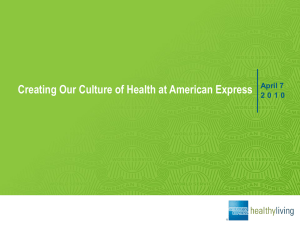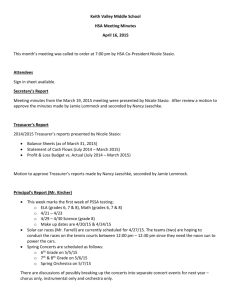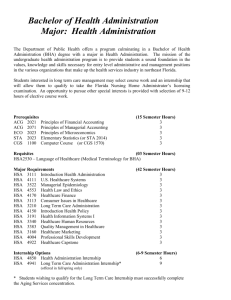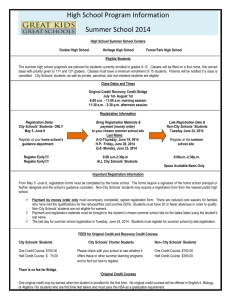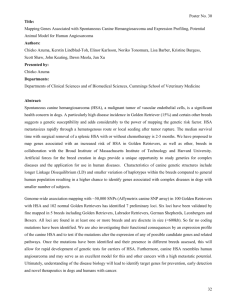Word
advertisement
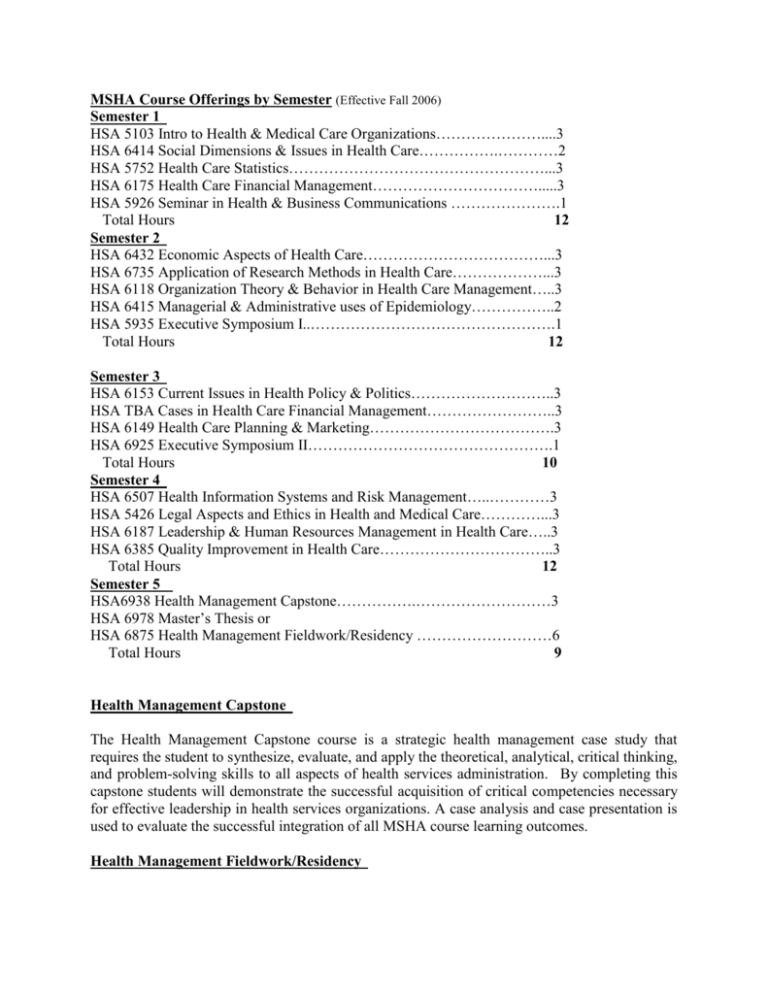
MSHA Course Offerings by Semester (Effective Fall 2006) Semester 1 HSA 5103 Intro to Health & Medical Care Organizations…………………....3 HSA 6414 Social Dimensions & Issues in Health Care…………….…………2 HSA 5752 Health Care Statistics……………………………………………...3 HSA 6175 Health Care Financial Management…………………………….....3 HSA 5926 Seminar in Health & Business Communications ………………….1 Total Hours 12 Semester 2 HSA 6432 Economic Aspects of Health Care………………………………...3 HSA 6735 Application of Research Methods in Health Care………………...3 HSA 6118 Organization Theory & Behavior in Health Care Management…..3 HSA 6415 Managerial & Administrative uses of Epidemiology……………..2 HSA 5935 Executive Symposium I..………………………………………….1 Total Hours 12 Semester 3 HSA 6153 Current Issues in Health Policy & Politics………………………..3 HSA TBA Cases in Health Care Financial Management……………………..3 HSA 6149 Health Care Planning & Marketing……………………………….3 HSA 6925 Executive Symposium II………………………………………….1 Total Hours 10 Semester 4 HSA 6507 Health Information Systems and Risk Management…..…………3 HSA 5426 Legal Aspects and Ethics in Health and Medical Care…………...3 HSA 6187 Leadership & Human Resources Management in Health Care…..3 HSA 6385 Quality Improvement in Health Care……………………………..3 Total Hours 12 Semester 5 HSA6938 Health Management Capstone…………….………………………3 HSA 6978 Master’s Thesis or HSA 6875 Health Management Fieldwork/Residency ………………………6 Total Hours 9 Health Management Capstone The Health Management Capstone course is a strategic health management case study that requires the student to synthesize, evaluate, and apply the theoretical, analytical, critical thinking, and problem-solving skills to all aspects of health services administration. By completing this capstone students will demonstrate the successful acquisition of critical competencies necessary for effective leadership in health services organizations. A case analysis and case presentation is used to evaluate the successful integration of all MSHA course learning outcomes. Health Management Fieldwork/Residency The health management fieldwork/residency requirement is an integral part of the MSHA curriculum. This experiential component of the program is designed for students to bridge the gap between academia and health management practice by .gaining practical experience in one of a variety of health care agencies and organizations. While students are encouraged to provide their placement preferences and to actively research potential fieldwork sites, the Graduate Program Coordinator and/or the Director of the Health Care Management Division have ultimate responsibility for all health management fieldwork/residency placements. Under the supervision of a qualified preceptor the fieldwork/residency experience benefits the student by providing an opportunity to apply management and leadership theory, management principles, and management practices. In order to be eligible for fieldwork/residency, students must complete all courses with a grade of “B” or above before they can register for this course. The fieldwork experience is conducted in the last semester of study, the semester of graduation. Full-time students will have no more than 3 years to complete the curriculum requirements and 5 years for Part-time students to complete the degree requirements. See appendices for detailed guidelines. Master’s Thesis The Master’s Thesis option is designed for those students interested in a health care career that requires a research focus and/or other academic or health policy pursuits. A completed thesis must be defended before a committee. Graduates choosing this option must demonstrate superior knowledge of statistics, quantitative methods, and scientific communication skills. In addition, students must be able to work independently under minimal guidance and direction of a graduate faculty who has Thesis Directive Status granted by the School of Graduate Studies and Research. Any faculty has the right to refuse a request for Chairperson of a Thesis project. Full-time students will have a maximum of 3 and one-half years to complete the program if the Thesis Option is chosen. Curriculum Changes The curriculum in the catalog of the year in which the student enters the university is the one under which he or she normally should obtain the degree if there has been no interruption in enrollment. In response to changes in health management education and in order to keep in line with occasional changes in accreditation requirements, the MSHA curriculum may change. Such changes may lengthen the enrollment time for a student who is not continuously enrolled. Such students must adhere to the new requirements introduced in the curriculum. A student who has been in regular attendance and has taken and passed the prescribed program of work each term, may expect to graduate under the curriculum/ catalog year they enrolled in. Students are encouraged to consult their academic Program Coordinator or Advisor for more information. Time Limit on Degree Completion All requirements for the MSHA degree must be completed within (3) three years from the term a student first registered for graduate credit, if they are a full-time student. For part-time students, all requirements must be completed within (5) five years from the term a student first registered for graduate classes. If the allotted time period is exceeded, students will be reevaluated and may be required to initiate a new program of study, or to complete special requirements as determined by the MSHA Program Coordinator and/or the HCM Division Director. Application for Graduation A student must complete the FAMU Application for Graduation during the first two weeks of the semester in which the degree is expected to be granted. This form may be obtained from the Advisor or Program Coordinator. After signatures are obtained, the Dean’s office will forward all graduation applications to the Registrar’s Office. It is the responsibility of the student to apply for graduation before the deadline. Student Code of Conduct For reference on the Florida A&M University Student Code of Conduct please refer to The FANG – Student Handbook, page 51, Florida Regulation 2.012. Class Attendance Students are expected to make the most of the educational opportunities available by regularly attending classes and other scheduled educational activities. Therefore, the University reserves the right to deal with individual cases of non-attendance. Students are responsible for all assignments, quizzes and examinations at the time they are due and may not use their unexcused absence from class for extensions of time to complete assignments or for permission to take make-up examinations or quizzes. Excusable absence from class for cause includes: (a) participation in recognized University activities, (b) personal illness properly documented, or (c) emergencies caused by circumstances over which the student has no immediate control. Class attendance is compulsory for all students. A student will be permitted one unexcused absence per credit hour of the course he/she is enrolled in. A student exceeding the number of unexcused absences will be withdrawn from the course and assigned the grade of “F.” Students may be readmitted to the class with the Dean’s and the instructor’s permission. The Dean’s letter of permission will become a part of the student’s permanent record. Academic Honesty Honesty, truth, ethics and integrity are essential values for students matriculating at Florida A & M University. Academic honesty is one of the most honorable traits that a student can demonstrate. Academic dishonesty includes plagiarism, cheating, or displaying any dishonest behavior either directly or indirectly, in any manner. “Plagiarism” is: the act of appropriating the literary composition of another, or parts or passages of his/her writings, or the ideas or language of the same, and passing them off as the product of one’s own mind. To be liable for plagiarism, it is not necessary to exactly duplicate another’s literary work, it being sufficient if unfair use of such work is made by lifting a substantial portion thereof, but even an exact counterpart of another’s work does not constitute plagiarism if such counterpart was arrived at independently” (Black, 1979, pg.1035). Any student caught cheating on an examination, assignment or project will receive a grade of “F” for that assignment, project or examination, and may also receive a grade of “F” for the course. Each faculty has the authority to set specific rules governing examination and assignments in their respective courses. Any student found guilty of plagiarism will receive a grade of “F” for that assignment or project and may also receive a grade of “F” for the course. Each faculty has the authority to set specific rules governing examination and assignments in their respective courses. Any student who feels he/she has been unfairly accused of dishonest behavior, should talk with the course instructor first. If resolution is not achieved, the student should talk with the Division Director. If resolution still is not achieved, the student should follow the School of Allied Health Sciences (SOAHS) Academic Grievance Procedure. See Appendix for complete policy. Academic Grievance Procedure It is the goal of the School of Graduate Studies and Research to provide students with an expeditious, fair, equitable, and consistent procedure for resolving their academic grievances. This policy includes procedures and rules to guide the student through the process. The intent is to resolve issues informally before filing a complaint, or seeking redress beyond the unit in which the alleged offense occurred. See Appendix for complete policy. Disruption of the Academic Process (Non-Clinical) Disruption of the academic process is defined as the act or words of a student in a classroom or teaching environment which in the reasonable estimation of a faculty member: a) directs attention away from the academic matters at hand, such as noisy distractions; persistent, disrespectful or abusive interruptions of lectures, examinations, or academic discussions, or b) presents a danger to the health and/or safety of the faculty member or other students. Consequences of Disruption of Academic Process The consequences for the disruption of the academic process will depend on the seriousness of the disruption and may range from a private discussion (step #1) between the student and the instructor to meeting with the Dean or designee (step #4) which may result in dismissal from the affected class. Particularly serious instances of rowdiness, fighting or other continuous disruption of the academic process may result in immediate removal from the class and a mandatory meeting with the Dean or a member of the Dean's Executive Council which may result in a possible suspension or permanent expulsion from the School. See Appendix for complete policy. Disabled Student Policy Every office and service by the University is open and available to all students. However, the Special Programs and Services office is prepared to assist disabled students in meeting their unique needs while at the University. Disabled students are requested to contact the Special Programs and Services office prior to their coming to the University. Before a disabled student is sent out on clinicals or management affiliation, the clinical site is informed of the student’s disability and needed accommodations. Confirmation of a permanent physical disability is to be evaluated/performed by FAMU Student Health Services or the student’s personal physician. Consultation with the FAMU/Americans with Disabilities Act Liaison Office will be held to determine any additional issues that need to be addressed. Documentation regarding the disability will be in the student file. The disability and its effect on the performance of clinical education and management affiliation activities will be discussed with the student. A release form is to be completed by the student giving permission to the clinical coordinator and/or faculty to discuss the disability/situation with prospective clinical affiliates. Activities which need to be limited, eliminated, and/or reformatted according to the abilities of the student and the capabilities of the facility will be determined. The student’s capabilities and limitations with prospective clinical affiliates will be discussed to determine the feasibility of scheduling the student’s clinical education/management affiliation. Student Dress Code Students must remember this is a professional school, and as such, it is expected that students display an appropriate level of judgment with regard to personal hygiene, grooming and dress. At no time will the following items of clothing, or clothing style, be acceptable for students attending classes in the School of Allied Health Sciences. Students must remember this is a professional school, and as such, it is expected that students display an appropriate level of judgment with regard to personal hygiene, grooming and dress. At no time will the following items of clothing, or clothing style, be acceptable for students attending classes in the School of Allied Health Sciences. • Wearing hats, caps or other head wear in the building* • Wearing sunglasses in the building* • Fish-net (stockings/hosiery) and other see-through clothing • Crop tops and other bare midriff tops including spaghetti strap blouses • Short shorts • Athletic-type, wide-armhole tank tops that expose chest, back or midsection • Any clothing with holes and cuts (i.e. jeans, shirts, tops, etc.) • Bare feet, thongs, or flip flops (i.e. beach shoes) • Suggestive, revealing or tight fitting clothing, or clothing with inappropriate pictures or slogans • Pants worn below the waistline and/or dragging the floor • Wrinkled, dirty or unsafe attire • Extreme personal presentation of any type (e.g. body piercing, hair style, tattoos) The above dress code will be in place on a daily basis for all students in the pre-professional, professional level and graduate courses in the School of Allied Health Sciences. A stricter code may be adopted by each division based on requirements for clinical and internship experiences. In addition, certain classes may have a specific dress code requirement, which will be outlined in the course syllabus. Students violating this dress code may be subject to dismissal from the class and may not return until that violation is corrected. *Wearing these items for medical or religious purposes is acceptable, with documentation.
